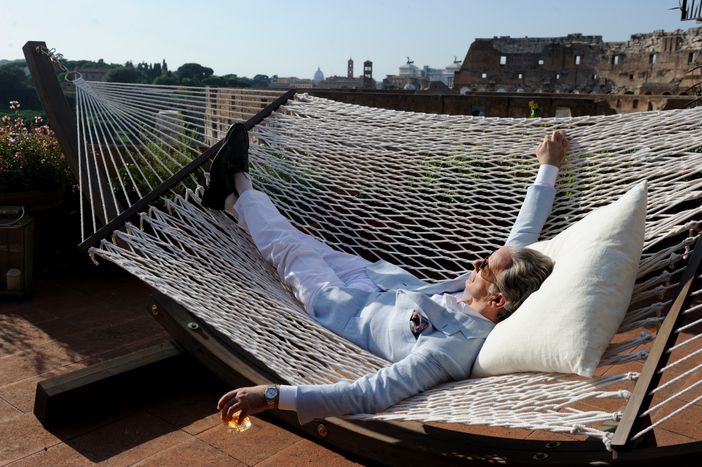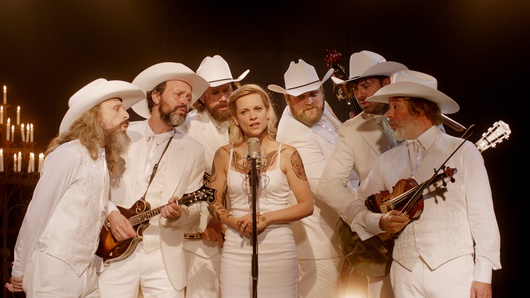
European Film Awards 2013: Poor but Decadent
Published on
Translation by:
 Danny S.
Danny S.
We're poor, but God forbid sexy. At the ceremony of the 26th European Film Awards, filmmakers rise with lashes on cultural politics, assertions of their European identity and hymns to Catherine Deneuve. Honored in particular are the old masters who indulge in decadence. But what about the younger generation?
Given the proper dose of glitter and the abundance of illustrious guests on the red carpet at the ceremony of the 26th European Film Awards in Berlin, one could assume that things weren't all that bad for European cinema, despite political and financial crises. But this illusion arises as quickly as Marion Döring, director of the European Film Academy (EFA) which bestows the coveted European Film Awards on their lucky winners, demolishes it: "It's often said that Berlin is poor, but sexy. Unfortunately for the European Film Academy only the former applies. It's only poor." That is why the location is so small, the scope of the Academy limited, and European film in general is left empty-handed. What could easily be dismissed as a wry introduction drags on throughout the evening, during which a total of 21 prizes are awarded to filmmakers from all over Europe and Israel.
Pedro Almodóvar, who is honored for his achievements in European cinema on the world stage, took the opportunity to discredit the catastrophic economic and cultural-political situation back in his home country. Despite the political and social crisis and a government that's "deaf and insensitive" to all of Spain's problems, Spanish filmmakers are still able to successfully make good films. Almodóvar especially dedicated his award to the younger generation of Spanish directors. Where they are, however, remains unclear. Unfortunately, it's part of the custom that for the most part Old Masters and established names get nominated for the major categories such as "Best Film," "Best Director" and "Best Screenplay." Younger crews are usually just left with minor awards like "Best Short Film" or "Best Newcomer."
 It seems somewhat askew that— after expressing the will for less predictability, and nominating a few young directors for some of the major categories—the European Film Academy would nevertheless fall back onto the plush cushions of its veterans. The excellent film The Broken Circle Breakdown (2012) by young Belgian director Felix van Groeningen was nominated in six categories, but in the end only its female lead Veerle Baetens won a trophy for "Best Actress". Oh Boy (2012) by the young German director Jan-Ole Gerster was also left empty-handed in the category of "Best Film," but was at least awarded the Prix FIPRESCI for "Best New Film". Oh Boy tells the story of the black-and-white days of Niko, a university dropout in Berlin. A life that's familiar to many Europeans as the golden, frustrating cage of the glittering metropolis.
It seems somewhat askew that— after expressing the will for less predictability, and nominating a few young directors for some of the major categories—the European Film Academy would nevertheless fall back onto the plush cushions of its veterans. The excellent film The Broken Circle Breakdown (2012) by young Belgian director Felix van Groeningen was nominated in six categories, but in the end only its female lead Veerle Baetens won a trophy for "Best Actress". Oh Boy (2012) by the young German director Jan-Ole Gerster was also left empty-handed in the category of "Best Film," but was at least awarded the Prix FIPRESCI for "Best New Film". Oh Boy tells the story of the black-and-white days of Niko, a university dropout in Berlin. A life that's familiar to many Europeans as the golden, frustrating cage of the glittering metropolis.
Also familiar with this cage is French-Portuguese director Ruben Alves, who won the audience award for his debut film La Cage Dorée (The Gilded Cage, 2013). The question of whether he's a French or a Portuguese director annoys him a little: "It's as if someone asks me if I like my father or mother more." The answer is emphatic: "I have no preference. I feel European." This emphasis on a common European identity spreads through the award ceremony like a mantra. Jan-Ole Gerster attaches to it a feeling of homesickness, while Catherine Deneuve realizes with marvel in her acceptance speech that, "before, I always thought I was a French actress, but as of a few years that's not true anymore. Now I see myself as a European."
Among British actors, European sentiments seem to be less common, since the seats of Keira Knightley, Naomi Watts and Jude Law—who were nominated for "Best Actress" and "Best Actor"—remain empty. Even François Ozon, who wins an award for his screenplay Dans la maison (In The House, 2012), darts off the stage so quickly that one can't be sure to have seen him at all. Paolo Sorrentino on the other hand—whose film La Grande Bellezza (The Great Beauty, 2013) won a total of four trophies, including "Best Picture" and "Best Director"—is searched for in Berlin to no avail. His film, a tribute to the city of Rome and Fellini's masterpiece Roma (1972), tells of the aging playboy Jep Gambardella, played by Toni Servillo (also a winner of "Best Actor"). Jep spends his opulent and rakish years in the Roman high society revue, stumbling from party to party, losing himself in a mentality of resplendent, world-weary decadence. The fact that the European Film Academy has decided to honor a hymn to Rome as an ageing diva, grants a deeper look into the Academy's mentality than might be welcomed by some.
Luckily, Romanian producer Ada Solomon—who won the award for "Best European Co Producer" (Prix EURIMAGES)—shines a ray of hope on the strange, seemingly dead glamour of the show. Her production company HiFilm has produced several successful, Romanian-directed films such as Best Intentions (2011) by Adrian Sitaru or Pozitia Copilului (Child's Pose, 2013) by Călin Peter Netzer, who won a Golden Bear at this year's Berlinale. "European film-makers are like a large family. Therefore European cinema often centers around family values," says Solomon. But one shouldn't get too nostalgic: "Yes, one should honor their parents and preserve the heritage of European cinema. On the other hand, we should also take care of our children, of the future and a new, younger cinema. Let us look to the future and not in the past." This year, the jury of the European Film Awards was only partially successful in this. It would be very desirably for the younger cinema, however, if next year's European Film Awards were less decadently paralyzing and a little bit sexier instead.
Translated from Europäischer Filmpreis 2013: Arm, aber dekadent


